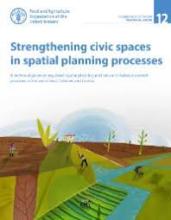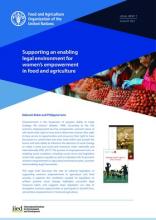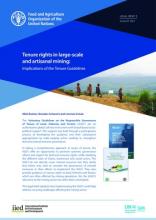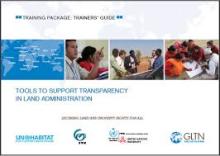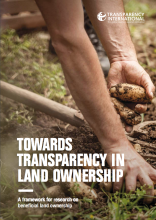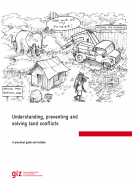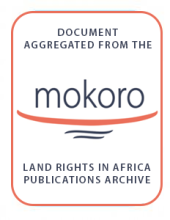Resources for Advocacy
Strengthening civic spaces in spatial planning processes
This technical guide provides strategies on how to strengthen, protect and promote legitimate tenure rights in spatial planning processes at the local, regional and national levels. It addresses state authorities involved in spatial planning processes, national governments and local authorities, and those operating on behalf of the state or within customary governance systems.
Supporting an enabling legal environment for women’s empowerment in food and agriculture
Empowerment is the “expansion of people’s ability to make strategic life choices”. According to the UN, women’s empowerment has five components: women’s sense of self-worth; their right to have and to determine choices; their right to have access to opportunities and resources; their right to have the power to control their own lives, both within and outside the home; and their ability to influence the direction of social change to create a more just social and economic order, nationally and internationally. The process of empowerment rests on enabling social conditions including social norms and legislative action that supports equality as well as individual will. To promote women’s empowerment in agriculture and food security, countries need enabling legal frameworks.
Tenure rights in large-scale and artisanal mining: Implications of the Tenure Guidelines
In taking a comprehensive approach to issues of tenure, the Voluntary Guidelines on the Responsible Governance of Tenure of Land, Fisheries and Forests (VGGT) offer an opportunity to promote systemic governance reform and respect for land and resource rights, while clarifying the different roles of States, businesses and social actors. The VGGT do not directly cover mineral resources but they clarify that States may wish to consider the governance of mineral resources in their efforts to implement the VGGT. They also provide guidance on tenure rights to land, fisheries and forests, which are often affected by mining operations. Yet, the VGGT’s relevance to the mining sector has often been overlooked.
This legal brief explores how implementing the VGGT could help address recurring challenges affecting the mining sector.
Tip Sheet for Journalists Covering the Impacts of the Coronavirus Pandemic on the Extractive Sector
This compilation of resources aims to help journalists cover the medium- to long-term impacts of the global pandemic on the governance of the oil, gas and mining industries in resource-rich countries. It includes blog posts with media-relevant resources such as good examples of existing coverage, suggested story angles and data sources.
Tools to Support Transparency in Land Administration: Trainer's Guide
This trainer's guide is complementary to this training toolkit. It is part of an approach that aims to sensitize government agents about land administration, develop their capacity to address issues of corruption and to enhance transparency in the land sector. It focuses specifically on land administration with a view to filling the capacity development gap in the land administration sector. Training content covers key themes clustered into different training sessions related to land governance, transparency, land administration and tools that could help bring about transparency.
Towards Transparency in Land Ownership: A Framework for Research on Beneficial Land Ownership
In many countries, unidentified private individuals and legal entities obtain significant economic benefits from land. This lack of transparency can make it harder for affected communities and governments to hold them accountable for land use decision-making and any sort of violation they commit. It can also leave investors open to risk if they do not know who is truly behind a company they are doing business with.
Building on a methodology used to investigate beneficial ownership of legal entities for the purposes of fighting tax evasion, money laundering and corruption, this publication proposes a research framework for assessing a country’s regulation of beneficial ownership in large-scale land holdings.
Understanding, preventing and solving land conflicts: A practical guide and toolbox
This guide is intended for practitioners who are confronted with land conflicts in the course of their work or are in a position to prevent them and/or include land governance as one pillar in their policies. It aims to broaden the understanding of the complexity of causes that lead to land conflicts in order to provide for better-targeted ways of addressing such conflicts, and provides a number of tools with which to analyse land disputes. In addition, this guidebook discusses a wide variety of options and tools for settling ongoing land conflicts and for preventing new ones. It adopts a gender-sensitive approach.
Women, Land and Corruption: Resources for Practitioners and Policy-Makers
Despite increasing attention in recent years, little evidence has been available on the issue of women, land and corruption in Africa to inform effective policy-making. There has been no compilation of relevant background information, lessons learnt and approaches to tackling land corruption as it affects women. This publication aims to address that gap, providing practitioners and decision-makers with a compendium of research findings, contextual information and practical solutions to help fulfil women’s land rights. It presents specifically gendered evidence on how women are affected by land corruption differently from men, followed by responses tailored to women’s needs to address gender-based inequalities over land. Covers Cameroon, Ghana, Kenya, Liberia, Madagascar, Sierra Leone, Uganda and Zimbabwe.


